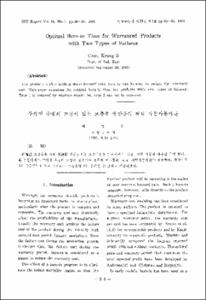國際法上의 强行規範
- Alternative Title
- A Peremtory Norm of International Law
- Abstract
- 전통적 국제법의 구조는 현대국제법에 있어서 완전히 사라져 버린 것은 아니다. 오히려 오늘날에도 기본적으로는 국제법규범 사이의 병열적 관계는 일반적으로 타당한 것으로 되어 있다. 그러나 전통국제법에서는 볼 수 없는 중대한 변화가 법규사이의 관계 및 법규의 성질에 나타나고 있다.
그 가장 현저한 것은 강행규범(jus covens)의 출현에 따라서 강행규범과 임의규범 사이에 서열화가 시작되었다는 것이다. 강행규범과 저촉하는 어떠한 국제법(임의)규범도 그것이 강행규범보다 후법이거나 혹은 특별법일지라도 무효로 간주된다. 이에 국제법에도 기본적인 단계구조가 나타나게 되었다.
현재 형성과정에 있으며 더욱이 얼마되지않는 강행규범이 무수히 많은 임의규범보다도 상위에 위치하게 된다. 이러한 의미에서 현대 국제법에 있어서 「상위규범이 하위규범에 우선한다」는 원칙이 타당하게 된다. 국제연합헌장의무의 우선을 정한 헌장 제103조는 강행규범이 아니고 국제법구조에 근본적 변동을 가져오는 규정도 아니다. 그러나 헌장규정. 특히 국제연합의 목적 및 원칙을 나타내는 규정들은 현대국제법의 기본원칙으로서 존중되어야 한다는 것을 나타내기 위해서는 제103조가 갖는 의미는 중요하다.
Viewed from the perspective of international law as understood in the first part of the 20th century, jus covens seemed hardly conceivable, since at that time the will of States was taken as paramount: States could, between themselves, abrogate any of the rules of customary international law. During the formative phase of international law, the view was not the prevailing one.
As late as in the 19th century it was quite natural to state that treaties must have an object which is physcially and morally passible.
After World War Ⅱ the international community became conscious of the necessity for any legal order to be based on some consensus concerning fundamental values which were not at the disposal of the subjects of this legal order.
Art. 53 of the Vienna Convention on the Law of Treaties defines a peremptory norm but gives no examples.
It is generally recognized that the fundamental principles of the UN Charter, especially the prohibition of the use of force(Art 2/4), have the character of jus congens, from which derogation is never possible.
It would seem correct to assume that all basic values of the international legal order may give rise to rules of jus covens which thereby protect the community as a whole.
Viewed from the perspective of international law as understood in the first part of the 20th century, jus covens seemed hardly conceivable, since at that time the will of States was taken as paramount: States could, between themselves, abrogate any of the rules of customary international law. During the formative phase of international law, the view was not the prevailing one.
As late as in the 19th century it was quite natural to state that treaties must have an object which is physcially and morally passible.
After World War Ⅱ the international community became conscious of the necessity for any legal order to be based on some consensus concerning fundamental values which were not at the disposal of the subjects of this legal order.
Art. 53 of the Vienna Convention on the Law of Treaties defines a peremptory norm but gives no examples.
It is generally recognized that the fundamental principles of the UN Charter, especially the prohibition of the use of force(Art 2/4), have the character of jus congens, from which derogation is never possible.
It would seem correct to assume that all basic values of the international legal order may give rise to rules of jus covens which thereby protect the community as a whole.
- Issued Date
- 1995
- Type
- Research Laboratory
- Alternative Author(s)
- Kim, Woo-Sung
- Publisher
- 사회과학논집
- Language
- kor
- Rights
- 울산대학교 저작물은 저작권에 의해 보호받습니다.
- Citation Volume
- 5
- Citation Number
- 2
- Citation Start Page
- 189
- Citation End Page
- 199
- Appears in Collections:
- Research Laboratory > Journal of social science
- 파일 목록
-
-
Download
 000002025489.pdf
기타 데이터 / 169.37 kB / Adobe PDF
000002025489.pdf
기타 데이터 / 169.37 kB / Adobe PDF
-
Items in Repository are protected by copyright, with all rights reserved, unless otherwise indicated.